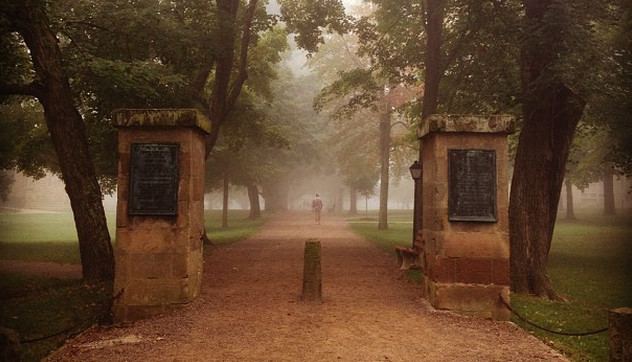
Wanted in College Graduates: Tolerance for Ambiguity
Three months after I graduated from college and following a summer journalism fellowship at the Arizona Republic in Phoenix, I had my first interview for a full-time newspaper reporting job. It was in Wilmington, N.C. The managing editor of the newspaper picked me up at the airport and after a quick lunch, he dropped me off on Front Street, the historic main thoroughfare along the banks of the Cape Fear River. He told me to go find a story.
It was a Friday afternoon in late August and I had to report and write the story by 5 p.m. I had never been to Wilmington before and I didn’t know anyone else in town. I didn’t have a car. All I had was the notepad and pen the editor kindly gave me. For the next several hours, I roamed the streets talking to business owners, local residents, and tourists. I eventually found a story—about a tourism campaign the state was undertaking after a close call with a hurricane—and filed it on time.
But as the editor later told me, the article itself was not the test. It was my reaction when he dropped me off: he wanted to see what I would do in an unfamiliar situation. Other job candidates, he said, either panicked and asked for a specific assignment or they figured out how to get the job done. He wanted employees who could cope with the unknown on a daily basis.
As artificial intelligence increasingly makes many jobs obsolete, success in the future will belong to those able to tolerate ambiguity in their work. Too many recent graduates, however, approach their job descriptions the way they did a syllabus in college—as a recipe for winning in a career. They want concrete, well-defined tasks, as if they were preparing for an exam in college. “Excelling at any job is about doing the things you weren’t asked to do,” said Mary Egan, founder of Gathered Table, a Seattle-based start-up and former senior vice president for strategy and corporate development at Starbucks. “This generation is not as comfortable with figuring out what to do.”
Excelling at any job is about doing the things you weren’t asked to do. - Mary Egan, founder of Gathered Table in Seattle and former senior vice president at Starbucks
Like many of the other 21st Century skills sought by employers, a tolerance for ambiguity is often developed early in life. The feedback children get from adults and teachers have an enormous impact on their ability to deal with uncertainty.
Carol Dweck, a Stanford University psychologist, has found that praising children for their intelligence, rather than for their effort, often leads them to give up when they the encounter the unknown. It’s much better in her opinion to compliment children for their persistence. People perform better when they can focus on things they can control rather than things they cannot.
Dweck has conducted several studies over the years that found people would do better if they thought of their intelligence as flexible and not something fixed at birth. People with what she calls a “growth mind-set” see challenges as opportunities to broaden their skills. But people who have been constantly praised for their intelligence freeze in ambiguous situations when they don’t know the answer and often tie themselves in knots trying to reach perfection.
The ability to tolerate ambiguity on the job requires people to think contextually, what I call the “connective tissue” that occupies the space in-between ideas. It is the “killer app” of today’s workplaces. We make these connections by following our curiosity and exploring and learning from peers.
Knowledge is not just what is in our brains, but is distributed throughout our networks. Learning happens by building and navigating those networks. But these networks are not just virtual—places such as Facebook, Twitter, Snapchat, or LinkedIn. Some of the best connections between knowledge occur in face-to-face conversations.
When I interviewed for that reporting job in North Carolina twenty years ago, I had no clue how much journalism would evolve over the coming decades. Even so, the set of skills journalism provided me—particularly, the initiative to find a story every day, the ability to recognize patterns and trends, and to synthesize disparate ideas—remain invaluable no matter what I do. You don’t need to major in journalism or become a reporter, of course, to acquire those set of skills, but they are crucial to navigating a future workplace marked with so much uncertainty.
Jeffrey Selingo is an author of two books on higher education. His next book, There Is Life After College: What Parents and Students Should Know About Navigating School to Prepare for the Jobs of Tomorrow, is scheduled for release by HarperCollins in the spring of 2016.
You can follow his writing here, on Twitter @jselingo, on Facebook, and sign up for free newsletters about the future of higher education at jeffselingo.com.
He is a regular contributor to the Washington Post’s Grade Point blog, a professor of practice at Arizona State University, and a visiting scholar at Georgia Tech's Center for 21st Century Universities.
The sales world is going remote...permanently!
6yMaking progress despite ambiguity is a skill that needs to be taught. I draw from Parallel Thinking by Edward deBono and I can guarantee that it will greatly assist you to be able to make progress despite ambiguity.
Head of Product
6yGood share Christine - another way to say it is, "We value the ability to think critically and discover the problem worth solving."
I know that place! Middle Path, Kenyon College
Business and Restructuring Attorney at Dykema
6yMost beautiful place at which I ever worked or lived.
Great photo of the gateway to Marriott park at Kenyon College. Fantastic article also. Demonstrates one of the best values of a Liberal Arts education.